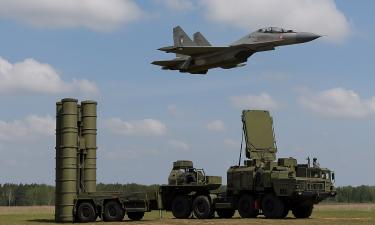Iranian factor of Iraq war
Everything that is going on in Iraq concerns Iran above all. They are both geographic and "axis-of-evil" neighbors. Iran's official reaction to the current Iraqi developments is "active neutrality".
Neutrality does not come easily to Teheran. Especially because the Shiite majority inhabiting Iraq and Iran is the stronghold of this direction of Islam. Now fighting is on in the territory where their holy cities are found - Najaf and Kerbela. Shiite spiritual leaders are voicing apprehensions that the mosques and with the tombs of Imam Ali, the son-in-law and nephew of Prophet Mohammed, and his son Imam Ali can be destroyed.
At that, both Iraqi and American missiles are falling on Iran and refugees may flow in any time. In cooperation with other states in the region, such as Syria, Turkey and Saudi Arabia, Iran is going to participate in the post-war development of Iraq so as to prevent its disintegration.
In the meantime, Iran is being neutral. The leadership of Iran has said many times that it backs neither Baghdad, nor Washington. What's more, the statement of the Islamic propaganda council, calling on Iranians to protest against the war in Iraq, says that "the Islamic Republic of Iran has serious differences with each of the warring sides".
Teheran has also declared it will not allow the forces of one of the largest groups of the Iraqi opposition - the Supreme Council for Islamic Revolution in Iraq, SCIRI, based on its territory - to cross the Iranian-Iraqi border. Meanwhile, the SCIRI is not in a hurry to intervene in the conflict despite the reports that its military units are stationing in Iran. SCIRI leader Baker al-Haqim has ordered his armed formations /their strength varies from 10,000 to 50,000 men, according to different estimations/ to maintain neutrality.
Before the war Washington asked Iran through unofficial channels to alter rhetoric from negative neutral to positive neutral. Nothing has come out of it.
In the course of the antiterrorist operation in Afghanistan, the Iranian authorities helped Washington by actively standing on the sidelines, not objecting against the dethroning of the Taliban and voicing readiness to help in the rehabilitation of Afghanistan. Then, American politicians firmly said that Teheran had given a constructive help in the antiterrorist campaign and the media began to talk of a possible warming of relations between Washington and Teheran. The honeymoon did not last long. US President George W.Bush included Iran in the "axis of evil" along with Iraq and North Korea, thus merely framing Iranian President Hatami, who initiated the rapprochement.
Teheran has not forgotten this "gratitude" and now its "active neutrality" is obviously in disfavor of the United States.
The deposing of the Saddam Hussain regime by the American hands is in Iran's interests: in this way it can easily get rid of a strong rival in the region, a rival which caused so many problems in the past.
However, Teheran fears that the United States will stay in the region for a long time and be able to put its man in Baghdad. Iran wouldn't like to be surrounded by pro-American regimes, Karzai in Kabul to be complemented by his likelihood in Baghdad.
After the deposing of Saddam, something the Americans and Britons are after, nothing will prevent Teheran from abandoning neutrality. Moreover, it will have to do so in order to take an active part in the post-war political life in Iraq, including the protection of rights of Iraqi Shiites. This is when SCIRI units, the network of pro-Iranian organizations, Iranian intelligence spread in the south and north of Iraq after the Iranian-Iraqi war, can be used against the occupational forces.
Iran will not have to come into open confrontation with the United States. To back the liberation guerilla movement in Iraq will be enough. It is with good reason that the Iranian leadership and leaders of the Iraqi opposition are already warning the United States and Britain that they should not stay in Iraq for long.
Marianna Belenkaya
Subscribe to Pravda.Ru Telegram channel, Facebook, RSS!





